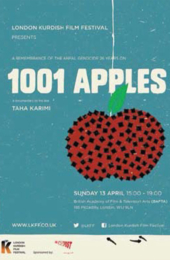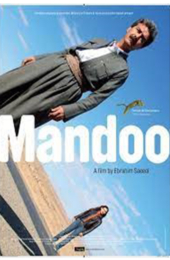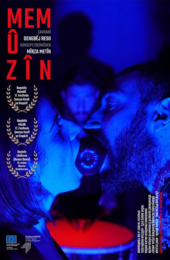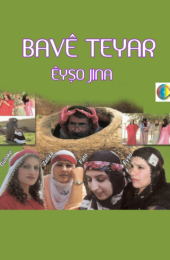The Path(Yol)
"The Path (Yol)" is a 1982 Turkish film directed by Şerif Gören and Yılmaz Güney. The film, pronounced as [joɫ], explores the lives of five Kurdish prisoners granted a week's leave. The story delves into their struggles and the harsh realities of their homeland. Ömer, a young Kurd from Urfa, is a central character dealing with smuggling-related imprisonment and family hardships[1][4]. Yılmaz Güney, co-director and co-writer, was a prominent Turkish author and director. The film received international acclaim, addressing themes of repression, tyranny, and inhumanity[9]. Güney's involvement in the film is noteworthy, considering his escape from Turkish prison to oversee its production[8].
Vodka Lemon
- Vodka Lemon (2003): A film set in a remote Yazidi Kurdish village in post-Soviet Armenia, directed by Hiner Saleem (also known as Huner Selîm) [1].
- Hiner Saleem (Huner Selîm): Born Azad Shero Selim, Hiner Saleem is a Kurdish director, screenwriter, and producer, known for films like "Vodka Lemon" and "My Sweet Pepper Land" [3].
- Vodka Lemon by Hiner Saleem: The film, directed by Hiner Saleem (Huner Selîm), portrays the life of a widower in a Kurdish village and his daily struggles [5].
- Biography: Hiner Saleem (Huner Selîm) was born on March 9, 1964, in Aqra, Kurdistan. He has a notable body of work in Kurdish cinema [4].
In summary, "Vodka Lemon Hiner Selîm" likely refers to the film "Vodka Lemon" directed by Hiner Saleem (Huner Selîm), offering a glimpse into Kurdish life in post-Soviet Armenia.
1001 Apples
- "1001 Apples" is a poignant documentary directed by Iranian-Kurdish filmmaker Taha Karimi, who tragically passed away in a car accident after completing the film in May 2013[1].
- The film delves into the little-known genocide against the Kurds, particularly the Anfal Genocide in 1988, where the Iraqi Ba'ath party murdered and buried 182,000 Kurds in mass graves[2][7][10].
- The storyline follows a character named Faraj who, along with four other survivors, distributes 1001 red apples and cloves in Kurdistan, symbolizing remembrance and resilience[3].
- Taha Karimi's work has been described as deeply moving and upsetting, shedding light on the consequences of the Anfal Genocide in Iraq and Kurdistan[5].
Zerê
The phrase "Zerê Hemo Beknezeryan" appears to be in Kurdish. However, without additional context, it's challenging to provide a precise translation or meaning. It may be a name, a location, or a specific expression. Kurdish is spoken in regions across the Middle East, and context is crucial for accurate interpretation. If you have more details, such as the context in which the phrase is used, it would help in providing a more accurate answer.
- Possible Kurdish Origin: "Zerê Hemo Beknezeryan" could be a name or a location in Kurdish. Kurdish names often have meaningful components.
- Context Matters: Understanding the context in which the phrase is used can aid in providing a more accurate interpretation.
Remember, consulting a native Kurdish speaker or providing additional details could yield a more precise answer
Bekes Karzan Kader
- Bekas Karzan Kader is a film director, writer, and producer.
- Background:
- Born on September 8, 1982, Karzan Kader is an Iraqi Kurdish filmmaker based in Stockholm [4].
- Filmography:
- His film "Bekas" highlights the innocence of two young leads on a journey [3].
- Recognition:
- Kader's short film "Bekas" won acclaim, and he continues his work as a filmmaker, also involved in projects like "TRADING PAINT" and "BEFORE WE DIE" [7].
- Trailer:
- Official trailer for "Bekas" can be found on YouTube [8].
- Additional Information:
- Viewer Ratings:
- "Bekas" has received positive ratings, with an IMDb score of 7.3 [10].
- Archival References:
- The film is cataloged in the LIBRIS index by the Royal Library of Sweden [9].
In summary, Bekas Karzan Kader is a notable filmmaker, recognized for the success of "Bekas" and continuing to contribute to the film industry.
On the Way toSchool
"On the Way to School" is a 2008 documentary directed by Özgür Doğan and Orhan Eskiköy. The film follows the life of a Turkish teacher, Emre, who is sent to a remote Kurdish village to teach Turkish to Kurdish children over the course of a year [1]. The documentary, titled "İki Dil Bir Bavul" in Turkish, highlights the challenges faced by Emre and explores the cultural and linguistic dynamics in the village [10].
Key details about the film:
- Title: On the Way to School (İki Dil Bir Bavul)
- Directors: Özgür Doğan, Orhan Eskiköy
- Release Year: 2008
- Duration: 80 minutes
- Genre: Documentary
- Plot: A Turkish teacher's experiences teaching Turkish to Kurdish children in a remote village [2].
The film is praised for its depiction of the challenges faced by the teacher and its exploration of cultural nuances in a politically charged environment [6].
The Dance of Aliand Zin
The Dance of Ali and Zin
Dayîka Nîştiman
"Dayîka Nîştiman" is a Kurdish theatrical play titled "Şanoya Dayîka Nîştiman û Koşka Miradan" written by Muhsîn Özdemîr. The play, considered one of the early works in Kurdish theater, revolves around the story of a mother, Dayîka Nîştiman, and the struggles of her three children in the town of Mahabad during 1946. The play is significant for its portrayal of the challenges faced by the characters in the historical context of Mahabad.
- The play is available for purchase, and more details can be found here (Source: #1).
- Additional information about the play and its historical context can be explored on eksisozluk1923.com (Source: #2).
- The theatrical piece is acknowledged as part of the early Kurdish theater scene, with historical significance in Mahabad (Source: #3 and #8).
For a deeper understanding, one can explore the themes and historical context of the play through the available sources.
After the Reza Shah regime left power in Mehabad after September 1941, an intellectual movement developed in the Mukriyan region, especially in Mehabad.
- Establishment of "Komelley Jiyanawey Kurd" (Kurdish Awakening Association) 16.09.1942,
- Formation of the Kurdish Lawan organization,
-Existence of literary spaces and associations,
- The publication of "Niştiman" magazine in May 1943 are some of these developments.
Mem û Zîn Mirza Metin
"Mem û Zîn" is a Kurdish love story directed by Mirza Metin, a prominent figure in contemporary Kurdish theatre. The play is known for its minimal aesthetic, resembling a ritual rather than a traditional play[2]. Mirza Metin, co-founder of Şermola Performance, has been actively involved in Kurdish theatre, exploring themes like self-being through projects such as "Dîwana Xwebûnê" (Karneval des Selbstseins)[5][8]. The play has received recognition, winning awards such as Best Music Design at the 17th Saqqez Kurdish Theatre Festival[3]. To stay updated, you can follow Mirza Metin on Instagram@mirzametin[9].
Hinek Henek PelFilm
- Hinek Henek is a content creator featured on the PELFİLM TV YouTube channel, known for humorous shorts and videos such as "SEYÎDXANÊ BOYAXCÎ - TÊLÎ"[1].
- The content includes episodes like "BANKA Û ZIMAN" and "DEREWÊN ZINDÎ - HINEK HENEK BEŞA 1"[2].
- Specific videos include "DOKTORÊ SUPER" and "STRAN Û KOMEDÎ - HINEK HENEK / JIN MA"[3][4].
- "Hinek Henek" released a single titled "Hinek Henek" available on Apple Music[5].
- The creator also engages with the audience on Instagram, sharing comedic content and updates[6].
- Scheduled releases are announced on platforms like Facebook, such as "Beşa 9 (DANASÎN)"[8].
- Notable videos include "SILÊMANÊ PÊXWAS 2 - HINEK HENEK" and "PARTIYA EM Ê HELKEN"[7][9].
All the works Bavê Teyar
Bavê Teyar, also known as Cuma Xelo, was born in Qamishlo, Rojava, Syria, in 1961. He is a Kurdish artist and father of eight children. His real name is Muhma Xelo. Bavê Teyar is recognized for his contributions to Kurdish music, with limited information available about his life and career. He has released songs and albums, and his biography provides insights into his background and artistic journey[2]. Additionally, he is listed in the Kurdish film list, reflecting his involvement in the cultural scene[3]. Bavê Teyar remains a figure of interest, and further contributions to his Last.fm profile could enhance the available information[1][4]
All the works Nishan Doxan
Nishan Doxan is a Kurdish actor and producer, born on February 15, 2012, in Germany. He is associated with Deysem Doxan, a production group. Nishan Doxan has a notable online presence, including a website [1], an Instagram account [2], a YouTube channel [3], and a Facebook page [4] [5]. His content includes videos and posts related to his work, scenarios, and more. For contact information, one can reach out to him via the provided details on the website [6]. Additionally, there's a video titled "Nishan Doxan | Kurdî şirîn e - By Deysem Doxan" on YouTube [8].
Sources:
All the works Lo Dublaj
Lo Dublaj appears to be a social media presence, primarily on platforms like YouTube, Facebook, and TikTok. It involves content related to dubbing or humorous voiceovers, often associated with Kurdish language.
- Lo Dublaj has a YouTube channel with playlists featuring videos and live content[1].
- The Facebook page "Lo Dublaj" shares humorous videos and connects with followers[2].
- Lo Dublaj content includes videos tagged with #Lo_Dublaj, suggesting a focus on dubbing and humor[3][4].
- The term "lo dublaj" is also mentioned in the context of Twitter discussions about dubbing[5].
- TikTok has content related to "lo dublaj"[10].
In summary, Lo Dublaj is a social media entity known for creating and sharing content, possibly humorously dubbed videos, on various platforms.
Penceşer Recep içen
The phrase "Penceşer Recep içen" appears to be a combination of names and terms related to performance arts in Kurdish culture. Recep İçen is associated with Şaneşîn Performans, a platform supporting independent artists in the cultural and arts ecosystem [1]. "Penceşêr" is a play co-authored by M. Xalit Ertoşî and Recep Îçen, inspired by Rolan Topor's work [2]. Recep İçen is mentioned as a contributor to the performance arts, specifically in writing and execution within Şaneşîn Performans [3] [4]. The term "ŞanoyaKurdî" is linked to Recep İçen and his role in a new story named "Penceşêr" within Şaneşîn Performans [5].














